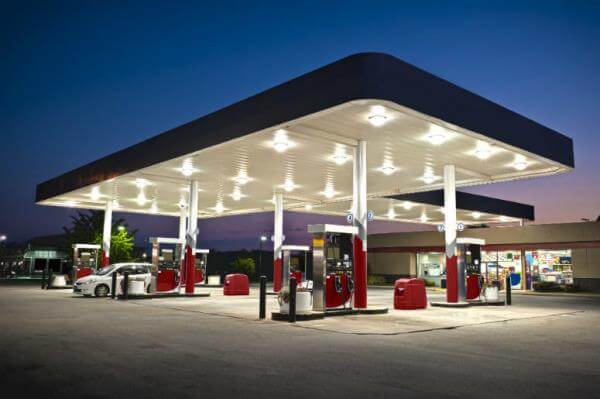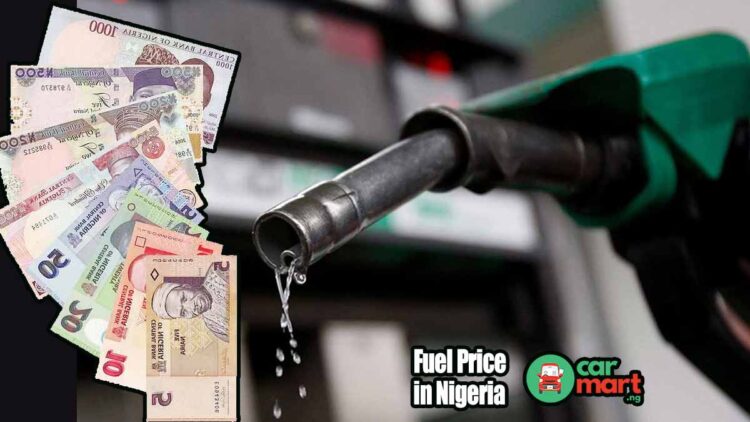The current price of petrol in Nigeria today ranges from N620 to N950 per litre. Prices may vary depending on the location from which you purchase. For instance, some parts of Imo state and Anambra sell petrol for prices ranging from N950 per litre to N1020, while some northern states sell petrol at a fixed price of N1020 per litre at the time of this report.
Table of Contents
The pump price of Premium Motor Spirit, popularly called petrol, was raised from N537/litre to N950/litre at some filling stations operated by the Nigerian National Petroleum Company Limited in Abuja.
Types of Fuel in Nigeria
Every engine uses a type of fuel specific to its design. Here is a list of petroleum products refined in Nigeria:
- Petrol
- Diesel
- Kerosene
- Liquid Petroleum Gas (LPG)
- Compressed Natural Gas (CNG)
Major fuel products in Nigeria are Petrol and Diesel because of their massive consumption in the country. Hence, these two resources generate most of the Nigerian government’s revenue.

| State | Fuel Price (₦) |
|---|---|
| Abia | 720 |
| Adamawa | 820 |
| Akwa Ibom | 780 |
| Anambra | 780 |
| Abuja | 750 |
| Bauchi | 850 |
| Bayelsa | 780 |
| Benue | 850 |
| Borno | 850 |
| Cross River | 780 |
| Delta | 780 |
| Ebonyi | 780 |
| Edo | 780 |
| Ekiti | 780 |
| Enugu | 780 |
| Gombe | 850 |
| Imo | 780 |
| Jigawa | 840 |
| Kaduna | 840 |
| Kano | 850 |
| Katsina | 850 |
| Kebbi | 850 |
| Kogi | 850 |
| Kwara | 850 |
| Lagos | 750 |
| Nasarawa | 830 |
| Niger | 830 |
| Ogun | 770 |
| Ondo | 780 |
| Osun | 780 |
| Oyo | 780 |
| Plateau | 820 |
| Rivers | 780 |
| Sokoto | 850 |
| Taraba | 850 |
| Yobe | 850 |
| Zamfara | 850 |
Petrol Quality in Nigeria
For a long period, NNPC had a supply of low-grade petrol in the country while the rest of the world was using finer quality fuel in their automobiles. Even the most undeveloped countries had better quality fuel supplies than Nigeria.
Fuels For Petrol Engines
Premium Motor Spirit, also known as petrol or gasoline, is used to power internal combustion engines mostly in vehicles and generators. Generated from crude distillation, our PMS consists of organic compounds and additives that enhance engine performance.
- Is compatible with all fuel vehicles.
- Is a superior-quality fuel thanks to the additives included in its composition.
The product benefits
- Ensures the long-term cleanliness of the engine’s fuel supply system.
- Allows for easier and faster filling thanks to its anti-foaming additive.
- Helps to prevent rust and corrosion.
Fuels For Diesel Engines
Automotive Gas oil, also known as Diesel, is generated from the crude distillation process and is used to efficiently power internal combustion diesel engines.
Diesel conforms to the following specifications from the Department of Petroleum Resources (DPR):
Features/Specifications :
- Specific gravity (@ 60/60°F)
- Distillation
- 1. FBP (OC) 10%
- 2. Recovery (@35°C%wt)
- Diesel index
- Flash point (of)
- Total sulphur (%wt)
- Copper corrosion (3hr @ 100°C).
- Kinematic viscosity (@1 OO°Fcst)
- Cloud point (oF)
- Carbon residue (Conradson on 10% residue) %wt
- Strong acid number (mg. KOH/g)
- Tobal acid number (mg. KOH/g)
- Ash content (%wt)
- Water by distillation (%Vol.)
- Water by extraction (%wt)
Petroleum Products Pricing Regulatory Agency (PPPRA)
The Petroleum Products Pricing Regulatory Agency (PPPRA) established in 2003, is a governmental organization tasked with the responsibility to attain a strong, vibrant downstream sub-sector of the petroleum industry, where refining, supply, and distribution of petroleum products are self-financing and self-sustaining.
PPPRA’s major functions are :
- To determine the pricing policy of petroleum products;
- To regulate the supply and distribution of petroleum products;
- To create an information databank through liaison with all relevant agencies to facilitate the making of informed and realistic decisions on pricing policies;
- To oversee the implementation of the relevant recommendations and programs of the Federal Government as contained in the Report of the Special Committee on the review of the Petroleum Products Supply and Distribution;
- To moderate volatility in petroleum products prices, while ensuring reasonable returns to operators.
To establish parameters and codes of conduct for all operators in the downstream petroleum sector.
Black Market Fuel Price in Nigeria Today
The black market for fuel in Nigeria is a significant and complex issue. This unofficial market arises due to the frequent fuel scarcity in the country, which is often caused by factors such as inadequate refining capacity, pipeline vandalism, and corruption. In this market, prices are typically higher than the official rates due to the risks and costs associated with illegal trading.
Black market fuel prices in Nigeria fluctuate based on fuel availability. During periods of acute scarcity, prices can skyrocket, sometimes even doubling or tripling the official price. However, during periods of relative abundance, black market prices may be closer to the official rates. It’s important to note that these prices are not regulated and can vary significantly from one location to another. The price of fuel today July 29, 2024, in the black market in Nigeria ranges between 820 NGN to 1,000 NGN depending on location.
Despite the high prices, many Nigerians are forced to buy fuel from the black market due to the unavailability of fuel at official outlets. This situation is particularly prevalent in remote areas where access to official fuel stations is limited. The black market, therefore, serves as an alternative source of fuel for many Nigerians, despite the associated risks and costs.
Efforts to curb the black market for fuel in Nigeria have been ongoing, with varying degrees of success. These efforts include increased law enforcement, improvements in infrastructure, and attempts to reduce corruption. However, until these issues are fully addressed, the black market for fuel in Nigeria is likely to persist, with prices remaining volatile and generally higher than the official rates.
NNPC New fuel price today
The Nigerian National Petroleum Corporation (NNPC) is the state oil corporation responsible for the exploration and production of petroleum in Nigeria. It plays an important role in determining fuel prices in the country. As of the time of updating this article on September 2024, the average NNPC new fuel price today is 620 NGN.
NNPC’s new fuel pricing regime is based on a ‘market-based’ pricing system. This means that the price of fuel in Nigeria is no longer fixed by the government but is determined by the forces of demand and supply.
Have 1 million naira and above to Buy or Sell Cars In Nigeria? Check carlots.ng
All rights reserved. Reproduction, publication, broadcasting, rewriting, or redistribution of this material and other digital content on carmart.ng is strictly prohibited without prior express written permission from Carmart Nigeria - Contact: [email protected]





